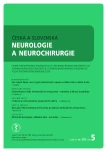Closure of Calvarial Defect with Custom-made Biocompatible Implant in a Pediatric Patient – a Case Report
Authors:
H. Homolková 1; M. Prchlík 2
Authors‘ workplace:
Klinika dětské chirurgie a traumatologie 3. LF UK a Thomayerova nemocnice, Praha
Oddělení dětské neurochirurgie
1; Klinika dětské chirurgie a traumatologie 3. LF UK a Thomayerova nemocnice, Praha
Jednotka intenzivní a resuscitační péče
2
Published in:
Cesk Slov Neurol N 2012; 75/108(5): 617-620
Category:
Case Report
Overview
Severe head injuries in small children cause serious damage to the brain and bones of the cranium. Only small calvarial bone defects in children up to 1 year of age may heal spontaneously, as the rate of ossification slows down after the first year of life. If the affected area is too large or bone self-repair capacity limited, the patient must undergo cranioplasty. In this article, the authors discuss the issue of calvarial defect reconstruction in very young children. As no tissue bank for long-term storage of autologous bone graft is available in the authors’ institution, they decided to reconstruct posttraumatic calvarial bone defect in a child using customized implant manufactured of biocompatible material. The authors describe their experience with PEEK (polyetheretherketone) implant used in 18-month-old boy. At the present time, 17 months after the procedure, the boy is doing well and is without neurologic and cosmetic sequelae. His psychomotor development is adequate for his age. Following discharge from a hospital, the patient is in a long-term follow-up program in our outpatient clinic.
Key words:
skull defect – cranioplasty – customised implant – PEEK – polyetheretherketone
Sources
1. Greene AK, Mulliken JB, Proctor MR, Rogers GF. Pediatric cranioplasty using particulate calvarial bone graft. Plast Reconstr Surg 2008; 122(2): 563–571.
2. Greenwald JA, Mehara BJ, Spector JA, Chin GS, Steinbrech DS, Saadeh PB et al. Biomolecular mechanisms of calvarial bone induction: immature versus mature dura mater. Plast Reconstr Surg 2000; 105(4): 1382–1392.
3. Cowan CM, Quatro N, Warren SM, Salim A, Longaker MT. Age-related changes in the biomolecular mechanisms of calvarilal osteoblast biology affect fibroblast growth factor-2 signaling and osteogenesis. J Biol Chem 2003; 278(34): 32005–32013.
4. Gosain AK, Santoro TD, Song LS, Capel CC, Sudhakar PV, Matloub HS. Osteogenesis in calvarial defects: contribution of the dura,the pericranium,and the sorrounding bone in adult versus infant animals. Plast Reconstr Surg 2003; 112(2): 515–527.
5. Koenig WJ, Donovan JM, Pensler JM. Cranial bone grafting in children. Plast Reconstr Surg 1995; 95(1): 1–4.
6. de Oliveira RS, Brigato R, Madureira JFG, Cruz AA, Mellho V, Filho FV et al. Reconstruction of a large complex skull defect in a child: a case report and literature review. Child Nerv Syst 2007; 23(10): 1097–1102.
7. Goh RC, Chang CN, Lin CL, Lo LJ. Customised fabricated implants after previous failed cranioplasty. J Plast Recontr Aesthetic Surg 2009; 63(9): 1479–1484.
8. Chao MT, Jiang S, Smith D, De Cesare GE, Cooper GM, Pollack IF et al. Demineralized bone matrix and resorbable mesh bilaminate cranioplasty: a novel method for reconstruction of large-scale defects in the pediatric calvaria. Plast Reconstr Surg 2009; 123(3): 976–982.
9. Brevi BC, Magri AS, Toma L, Sesenna E. Cranioplasty for repair of a large bone defect with autologous and homologous bone in children. J Ped Surg 2010; 45(4): E17–E20.
10. Grant GA, Jolley M, Ellenbogen RG, Roberts TS, Gruss JR, Loeser JD. Failure of autologous bone-assisted cranioplasty following decompressieve craniectomy in children and adolescents. J Neurosurg 2004; 100 (Suppl 2): 163–168.
11. Horák Z, Pokorný D, Fulín P, Šlouf M, Jahoda D, Sosna A. Polyetheretherketon (PEEK) – I. část: Perspektivní materiál pro ortopedickou a traumatologickou praxi. Acta Chir Ortop Traum Čech 2010; 77 : 463–469.
12. Pokorný D, Fulín P, Šlouf M, Jahoda D, Landor I, Sosna A. Polyetheretherketon (PEEK) – II. část: Poznatky o využití v klinické praxi. Acta Chir Ortop Traum Čech 2010; 77 : 470–478.
13. Josan VA, Sgouros S, Walsh AR, Dover MS, Nishikawa H, Hockley AD. Cranioplasty in children. Childs Nerv Syst 2005; 21(3): 200–204.
Labels
Paediatric neurology Neurosurgery NeurologyArticle was published in
Czech and Slovak Neurology and Neurosurgery

2012 Issue 5
- Advances in the Treatment of Myasthenia Gravis on the Horizon
- Memantine in Dementia Therapy – Current Findings and Possible Future Applications
- Memantine Eases Daily Life for Patients and Caregivers
-
All articles in this issue
- Can Intracranial Venous Reflux Be Detected from Transcondylar Approach? The Results of a Fusion Imaging Study
- Closure of Calvarial Defect with Custom-made Biocompatible Implant in a Pediatric Patient – a Case Report
- Motor Stereotypies in Childhood – Case Reports
- Therapy of Spinal Paragangliomas – Case Reports
- Amyotrophic Lateral Sclerosis in a Palliative Hospice Care Setting – a Case Report
- Idiopathic Aqueductal Stenosis and Developmental Speech Disorder in Children with Neurofibromatosis von Recklinghausen type 1 – Two Case Reports
- Neurological Complications Associated with Assisted Reproductive Technology – a Case Report
- The Effect of Small Amounts of Wine or Other Alcohol Drinks on Human Health and Longevity
- Emotional Memory – Pathophysiology and Clinical Associations
- Endovascular Therapy of Intracranial Aneurysms – Methods, Indications, Complications
- Validity and Predictive Value of Screening Tests in Prediabetic and Early Diabetic Polyneuropathy
- Incidence and Risk Factors of Postoperative Delirium
- Safety and Efficacy of Intravenous Thrombolytic Therapy of Cerebral Infarction in Patients over 80 Years of Age
- Cerebrospinal Fluid Triplet in the Diagnosis of Alzheimer-Fischer disease
- Cognitive Deficit And Contralateral Frontal Hypoperfusion In Patients With Cerebellar Lesions
- Baha as a Solution for Single-Sided Deafness after Vestibular Schwannoma Surgery
- Sequestration of MBNL1 Protein by Mutant ZNF9 mRNA in Lymphocytes of Patients with Myotonic Dystrophy Type 2
- Czech and Slovak Neurology and Neurosurgery
- Journal archive
- Current issue
- About the journal
Most read in this issue
- Motor Stereotypies in Childhood – Case Reports
- Emotional Memory – Pathophysiology and Clinical Associations
- Neurological Complications Associated with Assisted Reproductive Technology – a Case Report
- Cerebrospinal Fluid Triplet in the Diagnosis of Alzheimer-Fischer disease
